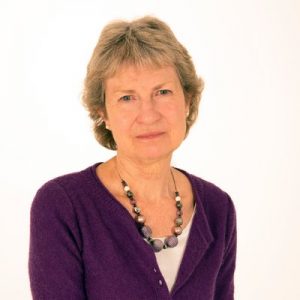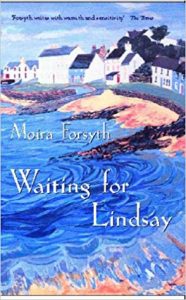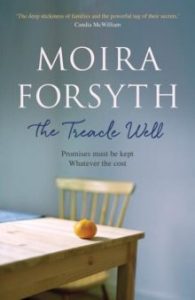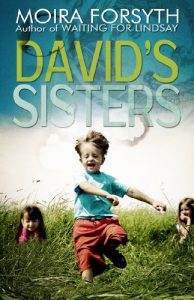An Interview with Moira Forsyth, author and publisher
 Have you ever made a decision, and then in the middle of the night sat up in a hot sweat as you realise you might have made a terrible mistake, and it’s too late to take it back? Let me explain my moment of madness. Moira Forsyth is an author of five novels and currently working on her sixth. She was also, for one week only, my ‘boss’ on my placement at Sandstone Press in Dingwall. On first contact, I took a chance and asked her to if I could interview her at some point, for another part of my course, and she agreed. I then went to bed that night and realised exactly how horribly wrong this could turn out – either I could hate the placement, or Moira could hate me; either way an interview under those conditions might be tricky, to put it mildly. I could only hope now, and do my very best to impress Moira throughout the week, which was my intention anyway.
Have you ever made a decision, and then in the middle of the night sat up in a hot sweat as you realise you might have made a terrible mistake, and it’s too late to take it back? Let me explain my moment of madness. Moira Forsyth is an author of five novels and currently working on her sixth. She was also, for one week only, my ‘boss’ on my placement at Sandstone Press in Dingwall. On first contact, I took a chance and asked her to if I could interview her at some point, for another part of my course, and she agreed. I then went to bed that night and realised exactly how horribly wrong this could turn out – either I could hate the placement, or Moira could hate me; either way an interview under those conditions might be tricky, to put it mildly. I could only hope now, and do my very best to impress Moira throughout the week, which was my intention anyway.
I had first spoken to Moira in her role as director of Sandstone Press, after I asked to be placed there. We exchanged an email or two and then arranged a phone call to finalise plans. I was instantly taken with her soft-spoken way, and her precise pronunciation, along with a beautiful lilting Scottish accent. We discussed the placement, and I asked some ‘housekeeping’ questions – what time should I start, was there anywhere to get something to eat ‒ and she laughed and then kindly assured me that these were important questions it was only that no intern had asked them before. She managed to make me feel practical rather than stupid for such mundane queries, showing a grace that very fortunately extended to our interview.
A couple of weeks later, my placement was nearly over and I was sitting at right angles to Moira at the eight-seater desk in the sparsely furnished office where an acquisitions meeting with all of Sandstone’s staff had just finished. It was my turn to ask the questions and I was nervous – she had seemed so knowledgeable and in control in the meeting earlier, her answers to questions so exact that I was worried that the interview would be a very short one..
I first asked whether she saw herself as an author who works in publishing or as a publisher who writes. Like Sally Fields in Sybil, I wanted to know which version of Moira Forsyth I was interviewing: ‘That’s a difficult question because it changes’. She has written since she was a child, it’s ‘in her blood’, although she wasn’t published until well into her forties because she ‘was completely hopeless’. But her work as an editor and publisher for 16 years means that those roles are also a huge part of her identity.
She wrote her first novel at twelve years old. ‘It owed a great deal to Enid Blyton’ she said, and we laughed at how many women of a certain age would say something similar (though my own first ten-page novella was a homage to The Chalet School series). Her early writings were rejected but she did get encouraging comments, though she said she found it hard to take them as such . Moira’s writing changed though when she moved back from England, where she had lived for twenty years, to Scotland: not to Aberdeenshire, where she grew up, but instead to the Highlands. In Dingwall, she finally found a writer’s group where she felt she belonged. The group’s writer-in-residence then was the well-known Scottish author Brian McCabe , who along with all the other good writers in the group produced work that made her feel ‘I needed to up my game’. They were all writing poems so she decided to do the same: ‘I thought, “I could write those wee things” ‘ Her confidence was well-placed as one of her first poems was published in The West Highland Free Press. Despite her literary reputation as a novelist, she remarked that she did not feel confident about her novel writing in those earlier days. However, Brian seems to have seen something in Moira’s writing and sent the book she was working on to his publisher. Although this book was never published, the advice she received gave her confidence to continue. It was also at the writer’s group that she met Robert ‘Bob’ Davidson, the founder of Sandstone Press.
 Following the ‘awful time’ of her divorce, she wrote the first chapter of what was to become Waiting for Lindsey, her first published novel, about a teenage girl who is on the beach with her siblings and suddenly goes missing. I asked Moira about the two themes that run through her work – family relationships and missing people. She is one of a trio of girls – along with her sister and a cousin – who were all very close as children and whose relationship forms the inspiration for the three girls in the Treacle Well, her fourth novel. Later, as we talked about her second book, David’s Sisters, she looked thoughtful as she said ‘I didn’t have a brother but always really wanted one. Maybe that’s it. There’s often a missing brother in my books, in my life’. As well as these recurring themes, Moira acknowledges that she has created a world that all her novels sit within, and each of her books certainly seems to have a similar hum running underneath the writing, a constant timeless undertow of the domestic and quotidian. She acknowledges as much:
Following the ‘awful time’ of her divorce, she wrote the first chapter of what was to become Waiting for Lindsey, her first published novel, about a teenage girl who is on the beach with her siblings and suddenly goes missing. I asked Moira about the two themes that run through her work – family relationships and missing people. She is one of a trio of girls – along with her sister and a cousin – who were all very close as children and whose relationship forms the inspiration for the three girls in the Treacle Well, her fourth novel. Later, as we talked about her second book, David’s Sisters, she looked thoughtful as she said ‘I didn’t have a brother but always really wanted one. Maybe that’s it. There’s often a missing brother in my books, in my life’. As well as these recurring themes, Moira acknowledges that she has created a world that all her novels sit within, and each of her books certainly seems to have a similar hum running underneath the writing, a constant timeless undertow of the domestic and quotidian. She acknowledges as much:
it is what we are rooted in: where you come from, where you grow up, your family relationships. Whether you are a refugee or a middle-class housewife from Kingston on Thames, they are what will make you happy or miserable, mostly.
 Her childhood was spent as part of a farming family in Aberdeenshire, and the settings of most of her books reflect this rural agricultural life. On her blog she writes about how the family was of the ‘old school’, where children were expected to toe the line and emotions were held in check. You get a taste of this In the Treacle Well when one of the main characters is talking with their mother and trying to get sympathy even when she knows that it isn’t going to be forthcoming. In much of Moira’s work traditional patriarchal relationships seep through, not as any sort of political statement but as a true picture of her own past and those of her protagonists. A snippet of the conversation between mother and daughter highlights this:
Her childhood was spent as part of a farming family in Aberdeenshire, and the settings of most of her books reflect this rural agricultural life. On her blog she writes about how the family was of the ‘old school’, where children were expected to toe the line and emotions were held in check. You get a taste of this In the Treacle Well when one of the main characters is talking with their mother and trying to get sympathy even when she knows that it isn’t going to be forthcoming. In much of Moira’s work traditional patriarchal relationships seep through, not as any sort of political statement but as a true picture of her own past and those of her protagonists. A snippet of the conversation between mother and daughter highlights this:
‘Were you wanting another bairn? What does Harry say?’
‘I’d like to be able to think about it.’
‘You’re young yet. But I dinnae see what the problem is. Was Harry wanting a boy?’
‘Mother, you sound as if all that matters is what Harry wants. What about me?’
‘We cannae be thinking about ourselves all the time.’
With the first chapter of Waiting for Lindsey written, she stalled. Moira is used to false starts in all her work though, and the second chapter came over a year later, after which the story just flowed. All her novels come fast once she has the structure in place. Often they start with a single scene, she said, describing a family incident that became the inspiration for her next novel, David’s Sisters, which she said was written too fast – though she didn’t elaborate on this – because of the excitement of it being part of a two-book deal. The Treacle Well broke her own pattern of ‘a year of thinking, a year of writing ‘, and took seven years to complete. Part of the reason for its lengthy gestation was that she had a full-time job, working at Sandstone which had recently been started by her and Bob, and was running her family as a single parent. When she did start to write again the book developed quickly. I asked about her writing habit, and she said that she used to write every day, or at least every Sunday when she was working full time; at present she is so busy with Sandstone that she writes whenever she can – including taking a week off at New Year to write, which allowed her to write sixteen thousand words of the novel she is working on and which suggests she wasn’t exaggerating when she said that she wrote quickly! I asked her if she would like to write every day, to which her answer was an emphatic ‘Yes’. ‘My ideal life’, she said, ‘would be to write all morning and garden all afternoon’, laughing as if she could not imagine it happening. Later we spoke about retirement which she feels is feasible only when the company has more management in place, and hopefully, she says, before all her writing has dried up or her ideas are lost from memory.
Her busy life doesn’t seem to leave much room for reading, and on her blog she cited Agatha Christie as a favourite go-to when she needs to relax. However when I asked about her reading habits , she said immediately that of all the books she has read, the one she wishes she had written is George Eliot’s Middlemarch. Along with its multiple layers of plot and beautiful writing she admires it because:
it is so humane. It’s so much about human frailty and about how we have our ideal version of ourselves and fall short every time. She does that so wonderfully well. She also captures perfectly that period of intense political activity and unrest while also capturing the lives of that community who were not by any means at the centre of things politically, but who are affected by it. It’s so complex and wonderful.
 Eliot makes characters so believable she said, fully rounded with the potential within the space of the novel to grow and change, something which she sees as crucial even though this kind of writing is, she thinks, changing in twenty-first century novels. I told her that this was one of the things I was enjoying in the Treacle Well, how the characters developed, and she said she was glad because ‘they lived with her for so long, she couldn’t go anywhere without them being in her head’, which made it difficult for her to move on to the next novel.
Eliot makes characters so believable she said, fully rounded with the potential within the space of the novel to grow and change, something which she sees as crucial even though this kind of writing is, she thinks, changing in twenty-first century novels. I told her that this was one of the things I was enjoying in the Treacle Well, how the characters developed, and she said she was glad because ‘they lived with her for so long, she couldn’t go anywhere without them being in her head’, which made it difficult for her to move on to the next novel.
As we talked about changing patterns in fiction, Moira observed that the trend now is for issue-driven narratives, such as feminism or racial issues, and that these are not the primary focus of her own work. I asked tentatively if it bothered her that these are the types of books that often receive the accolades; she said it no longer bothered her, though it might have done at one point ‒ she is comfortable with the fact that her books are unlikely to win awards or have huge sales. Her views on this have changed, simply because of where she is in her life now. ‘It doesn’t bother me now, I can say it, that this book I’m working on now might be my last one – though it probably won’t, I don’t think.’
Although the interview was about authorship and writing, it was difficult to separate that from the editing or publishing. I asked about the book she would most like to publish as an editor. Her favourite genre is literary biography, and she prefers editing nonfiction because editing fiction while she herself is writing allows the other author’s voice into her head and confuses her own story. More than anything, she would like to publish a book that makes a difference and is important. One of the books the company is working with currently is about modern slavery, and she relates to the imprisonment theme there having worked in prisons with young offenders: ‘They were just boys’. ‘I can’t think of anything worse than to be imprisoned for something you didn’t do’ she said, which is why she supports Amnesty International, and was so keen on the slavery book she mentioned. This is a book she thinks will make a difference; I remembered at that point how, when we were talking about ‘readers’ that the company uses to sift through and report on submissions, she had said that she had already decided at that point they were publishing it, whatever the reader’s report, something which she has never done with a book before.
When I asked her the standard interview question about what advice she would give to new writers, her response was quick, it was a question she had obviously thought about – possibly while she worked as a creative writing tutor: ‘Don’t be so slow off the mark’. She laughed and wondered out loud why she didn’t push herself more when she was younger, why she didn’t have more confidence. We talked around this for a while, the confidence issue – it was something I related to as well. She spoke about how life gets in the way, children and family life especially , but she reached a point where she decided to put her writing first, and to write instead of doing other things. She seemed to shine as she said, her voice taking on a new intensity, ‘Put it first and something will happen. Anywhere in life not just writing. If you really want something put it first, especially for women’. I noted this down in my personal diary and wondered if she had passed this valuable message onto all the young people she had encountered in her work in education and the prison service – I hoped so. That was her advice as a writer, and her advice as an editor was just as useful: first try as many different writing styles and forms as possible, and then get into a good writers’ group. Her telling of stories about the writers in her own writers group from years gone by showed a strong sense of humour behind her otherwise quiet gentle exterior. More advice followed:
get published, even small pieces in small places, to show you’ve been working at your writing and are taking it seriously. Also, don’t give up your day job because what will you write about? You end up becoming one of those writers that only writes about writing, which is just awful.
Talking specifically about essayists, she says their needs are different, and they need to write individual pieces and find publication places for them – I appreciated how she managed to take on board where I was with my writing and give advice even in the middle of our interview; I get the impression she was a great creative writing tutor when she did it years ago.
Having spent so much time studying authors whose writing is their whole world, it was reassuring somehow for me to talk to someone who slotted her writing into her life, simply because she loves to write, and continues even with the awareness she’s unlikely to have a best seller or receive awards. As I thanked her at the interview’s end, she said she had really enjoyed talking about her own writing for a change. Then she went away to read someone else’s writing, knowing her own would wait for her.

Leave a Reply